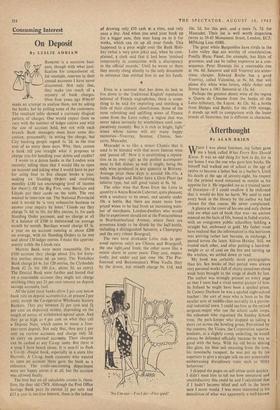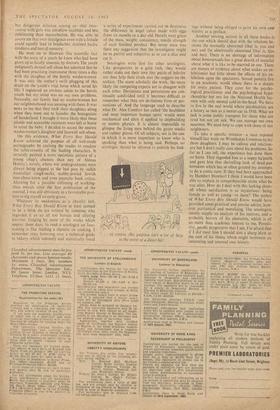Afterthought
By ALAN BRIEN
WFIEN I was about fourteen, my father gave me a book called What Every Boy Should Know. It was an odd thing for him to do, for in our house I was the one who gave him books. He himself had walked out of school at the age of twelve to become a lather boy in a barber's. Until his death at the age of seventy-eight, his respect
for the printed word remained as outsize as his appetite for it. He regarded me as a trained taster of literature—if I could swallow it he reckoned that it would do him no harm. We used to read every book in the library by the author we had chosen for that course. He never complained.
A glance at the cover of his one and only choice told me what sort of book that was—an ancient manual on the facts of life, bound in faded scarlet, with an overgrown public schoolboy holding a straight bat, embossed in gold. My father must have realised that the informatiorlin this heirloom was arriving rather late because, in exchange, I passed across the latest Aldous Huxley. Still, we trusted each other, and after putting a hundred- weight or so of coal on the fire and turning up the wireless, we settled down to read.
My book was certainly more pornographic than his. Sex books of that period were always very personal works full of chatty anecdotes about weak boys brought to the verge of death by lust. The author was strongly present on every page so that I soon had a vivid mental picture of him. In Ireland he might have been a spoiled priest. In County Durham he was a spoiled night-school teacher : the sort of man who is born to be the secular arm of middle-class morality in a provin- cial industrial town. I could see him as the retired sergeant-major who ran the school cadet corps, the sidesman who organised the Sunday School treat, the park-keeper who stopped us taking a short cut across the bowling green, Patronised by the masters, the Vicars, the Corporation superin- tendents, as a slightly comic underling, he would always be defended officially because he was so goad with the boys. With his old boots shining like glass, his blue suit steaming from the iron, his moustache rampant, he was put up by his superiors to give a straight talk on any potentially embarrassing disciplinary topic such as 'filthy behaviour.'
I skipped the pages on self-abuse quite quickly. I didn't need him to tell me how unnatural and unsatisfactory this could be and I calculated that if I hadn't become blind and soft in the brain now I never would. I was more interested in his demolition of what was apparently a well-known
hut dangerous delusion among us—that inter- course with girls was somehow healthier and less debilitating than masturbation. He was able to assure me that over-indulgence even with a female could equally lead to headaches, strained backs, tiredness and loss of memory.
He went on to illustrate this scientific fact with the story of a youth he knew who had been given up as fatally anaemic by doctors. The youth indignantly denied self-abuse but admitted that he had been practising intercourse three times a day with the daughter of the family washerwoman. It was only the author's swift plugging of this drain on the youth's vital force which saved his life. I registered an envious salute to the heroic youth but my mind was on my own problems. Naturally, our family had no washerwoman but our neighbourhood was teeming with them. It was news to me that they took their daughters along when they went out to launder the bourgeoisie of Sunderland. I thought it more likely that those pliable and accessible creatures were left at home to mind the baby. I decided to accost the nearest washerwomen's daughter and farewell self-abuse.
On this evidence, What Every Boy Should Know achieved the purpose of all well-made pornography by exciting the reader to emulate the achievements of the leading characters. It certainly painted a more optimistic picture of a young chap's chances than any of Aldous Huxley's novels, where wet undergraduates were always being pipped at the bed post by oafish Australian srough-necks, stubby-jowled Jewish men-about-town and even paunchy book critics. All6wing for a possible stiffening of working class morals since the first publication of the manual, I was still obviously in a favourable posi- tion to dig myself an early grave.
Whatever its weaknesses as a chastity belt, What Ever' 130y Should Know at least seemed to be a book an Sex written by someone who regarded it as an all too human and alluring pastime. Judgiag by most of the works which appear thee days, to read a sexologist on love- making is like0 reading a chemist on cooking. I remember once browsing over a technical guide to bakery which solemnly and statistically listed a series of experiments carried out to determine the difference in angel cakes made with eggs from six months to a day old. Details were given of the mass, weight, consistency, tensile strength of each finished product. But never once was there any suggestion that the investigator might be so partial and subjective as to cut a slice and eat it.
Sexologists write first for other sexologists. Like prospectors in a gold rush, they would rather stake out their own tiny patch of inferior ore than help their rivals sort the nuggets on the surface. The more scholarly the work, the more likely the competing experts are to disagree with each other. Deviations and perversions are con- tinually subdivided until it becomes difficult to remember what they are deviations from or per- versions of. And the language used to describe what Dr. Alex Comfort has called 'the healthiest and most important human sport' would seem mechanical and alien if applied to shipbuilding or atomic physics. It is almost impossible to glimpse the living men behind the gauze masks and rubber gloves. Of all subjects, sex it the one in which it is more important to know who is speaking than what is being said. Perhaps no sexologist should be allowed to publish his find- • . of course, this position isn't a lot of help in the event of a direct hit.' ings without being obliged to print his own case histdry as a preface.
Another missing section in all these books, is the one which should deal with the relations be- tween the normally abnormal (that is, you and me) and the abnormally abnormal (that is, him and her). There is no shortage of information about homosexuals but a great dearth of material about what it is like to be married to one. There are masses of evidence about what makes an ex- hibitionist but little about the effects of his ex- hibition upon the spectators. Sexual pundits live in an academic world where there is a doctor for every patient. They cater for the psycho- logical practitioner and the psychological hypo- chondriac but not for the National Health lay- men with only mental cold-in-the-head. We have to live in the real world where psychiatrists are a luxury as rare as a motor-car in 1910. What we lack is some public transport for those who are tired but not yet sick. We can manage our own neuroses. We need help to cope with those of our neighbours.
To take a specific instance--a man exposed himself last week on Wimbledon Common to my three daughters. I may be callous and reaction- ary but I don't really care about his problems. So far as I can tell, the experience has done them no harm. They regarded him as a soppy ha'porth and gave him that shrivelling look of dead-pan boredom which has so often greeted my attempts to do a comic turn. If they had been approached by Humbert Humbert I think I would have been able to explain in comprehensible terms what he was after. How do I deal with this lurking show- off whose satisfaction is so mysterious—being female as well as young--to them? The author of What Every Boy Should Know would have provided some.practical and precise advice, how- ever puritanical and moralising. The sexologists merely supply an analysis of his motives, and a probably history of his obsession, which is of no more than academic interest to me. Permis- sive, pacific progressive that I am, I'm afraid that if I did meet him I should aim, a sharp blow at the root of his illness which might terminate an interesting and unusual case history.































 Previous page
Previous page